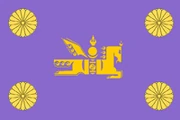
|
Outdated Template In Use! | |
| Please note that the template that you are using is outdated. This may cause issues with the template, the page and the wider Particracy Wiki! Please the current list of supported and up to date templates located here: Templates Manual of Style. If you need assistance please contact Wiki Administrator Auditorii via the in-game forums or Discord. |
| Gao-Showa Imperial Party | |
|---|---|
| Leader | Tokugawa Kazuma |
| Founded | 2316 |
| Dissolved | {{{dissolved}}} |
| Headquarters | Akihito (Kaiserburg), Hilgar |
| Nation | Hulstria & Gao-Soto |
| Ideology | Monarchism, Nationalism, Religious Democracy, Conservatism |
| Political Position | Right Wing |
| International Affiliations | International Monarchist League International Religious Democrats |
| Colours | 8968CD |
| Website | {{{website}}} |
The Gao-Showa Imperial Party Party (Gao-Showa:Gao-Showa Teikokuto), or GSIP for short, is a political party in the country of Hulstria & Gao-Soto. It was created to represent the native population's in Hilgar and Mitrania following the collapse of Communism. It seeks to preserve the rights of the Gao-Showa (formerly known as the Gishotoi) and to increase their role in the culture and government of the nation. The GSIP is headquartered in Akihito, Hilgar and it has offices in most Gao-Showa areas. It was re founded in 2418 by Tenno Meiji Takara to fight against apartheid and to once more give the Gao-Showa representation in their own country and was renamed the GSIP in 2469 a year after Takara's death. The GSSP is dominated by the major native aristocratic clans.
History of the GSIP[]
There were two main factors leading to the creation of the Goa-Showa Peoples' Party. The first was the collapse of State Communism which greatly increased the rights of native people's to live and worship as they wished and the second was an influx of migrants from the beyond the frontiers of the nation. Day by the day the Gishotoi population was increasing and interest in the traditional culture and the demand for better representation in national politics. Various movements started to spring up in the second decade of the 24th century seeking to do just this and eventually they came together as the party under the leadership of Tokugawa Ieyasu the head of the Gao-Showa Culture Society and a leading figure in the fight against communism.
The GSPP quickly gained in popularity winning 9 elections for head of state in a row, being the largest party in the nation for 32 years between 2319 and 2351, as well as holding the head of state position for 28 of those years. For a long period the GSPP was considered the strongest party in the world and is remembered as one of the most successful parties in world history.
Over this first period the GSPP help to dismantle the Communist system, at first working with the republicans but then siding with the Imperial Hulstrian Party. This coalition of previously bitterly opposed aristocracies helped to warm relation between the Hulstrian and the Gao-Showa population for many years.
However it was not to last, the GSPP was highly factional and as infighting reached a crescendo the party collapsed, paving the way for a Hulstrian ascendancy and the dark period of Gao-Showa history under Apartheid. Following the accesion of Meiji Takara however this all changed as the new imperial court strengthned its position and united the Gao-Showa in the fight against aparthied. The refounded GSPP soon overthrew the aparthied system and started a new golden period called the Meiji restoration, with the Emperor being officially recognised by the government in Kien and the Gao-Showa regaining their rights within the nation.
The party was renamed the Gao-Showa Imperial Party in 2469 in recognition of the increased importance of Imperialism in the party's poltics compared to when it was originally founded and to show the new unity of all Gao-Showa clans behind the Imperial family.
The Party collapsed in 2477 after losing many voted to the primarily Gao-Soto based National Centrist Coalition which provided a far more populist platform than the elitist GSIP. With few seats in the Diet the party leadership found it impossible to balance the confliciting interests in the party.
Notable Members[]
Taisho[]
| Name | Time in Office |
| Tokugawa Ieyasu | 2316-2328 |
| Tokugawa Jiang | 2328-2351 |
| Meiji Takara | 2418-2426 |
| Kyuma Hisamitsu | 2426-2462 |
| Tokugawa Kazuma | 2462 |
Factions[]
Though less prevalent before factions still exist and are still largely based around the leaders of clans. The decline of the Tokugawa and the rise of the Meiji faction has increased the power of the leader however due to the increased reverence the position now receives.
Political Positions[]
Shintoism[]
The Party is religious and proud of it. However Shintoism is not merely a religion but an identity for the Gao-Showa. It is the thing that keeps their link to their past and to their native land and is something they seek to promote. Shintoism has also always been the religion of the nation and always will be. Nearly all Gao-Showa wish a return to state Shintoism though the degree to which it would be imposed varies across the clans. The belief in Shintoism also fuels the drive to rename the nation to Gao-Soto and the people to Gao-Showa as these are viewed as holy names presented by the Kami of Shinto.
Economics[]
The GSPP has been a capitalist party in line with the views of most Gao-Showa who support the free market and equate socialism with the oppression of the largely socialist Gishoton population and the secret purges undertaken at various times under communist rule. However the effects of the more unrestrained capitalism of the Hulstrian Imperialists and the rise of the more leftish Imperial Clan Meiji has pushed the GSIP to a more centrist position.
Federalism[]
The GSIP is very much a federalist party and wants as many powers as possible distributed from the centre. This is largely because it would be harder for the Hulstrian majority to suppress Gao-Showa culture when that power has been dispersed from Kien.
The GSIP's View of Other Parties[]
Imperial Hulstrian Party[]
The IHP and GSIP share a close relationship as the imperial parties representing the views of their respective monarchs in the diet. Once again racial divisions have been set aside as the two parties work for the betterment of the entire nation.
Mormon Socialist Party[]
The Mormon's recent drift to the left has been a cause for concern but their continued support for sensible social policies means they are still a valuable partner in the diet.

